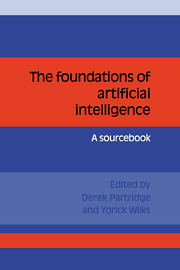Book contents
- Frontmatter
- Contents
- List of contributors
- Preface
- Acknowledgments
- 1 Introduction
- 2 The formal foundations of AI
- 3 Levels of theory
- 4 Programs and theories
- 5 The role of representations
- Thinking machines: Can there be? Are we?
- Evolution, error, and intentionality
- 6 The role of programs in AI
- 7 Rational reconstruction as an AI methodology
- 8 Is AI special in regard to its methodology?
- 9 Does connectionism provide a new paradigm for AI?
- 10 The role of correctness in AI
- 11 Limitations on current AI technology
- 12 Annotated bibliography on the foundations of AI
- Index of names
Thinking machines: Can there be? Are we?
Published online by Cambridge University Press: 03 May 2010
- Frontmatter
- Contents
- List of contributors
- Preface
- Acknowledgments
- 1 Introduction
- 2 The formal foundations of AI
- 3 Levels of theory
- 4 Programs and theories
- 5 The role of representations
- Thinking machines: Can there be? Are we?
- Evolution, error, and intentionality
- 6 The role of programs in AI
- 7 Rational reconstruction as an AI methodology
- 8 Is AI special in regard to its methodology?
- 9 Does connectionism provide a new paradigm for AI?
- 10 The role of correctness in AI
- 11 Limitations on current AI technology
- 12 Annotated bibliography on the foundations of AI
- Index of names
Summary
Introduction
Futurologists have proclaimed the birth of a new species, machina sapiens, that will share (perhaps usurp) our place as the intelligent sovereigns of our earthly domain. These “thinking machines” will take over our burdensome mental chores, just as their mechanical predecessors were intended to eliminate physical drudgery. Eventually they will apply their “ultra-intelligence” to solving all of our problems. Any thoughts of resisting this inevitable evolution is just a form of “speciesism,” born from a romantic and irrational attachment to the peculiarities of the human organism.
Critics have argued with equal fervor that “thinking machine” is an oxymoron – a contradiction in terms. Computers, with their foundations of cold logic, can never be creative or insightful or possess real judgment. No matter how competent they appear, they do not have the genuine intentionality that is at the heart of human understanding. The vain pretensions of those who seek to understand mind as computation can be dismissed as yet another demonstration of the arrogance of modern science.
Although my own understanding developed through active participation in artificial intelligence research, I have now come to recognize a larger grain of truth in the criticisms than in the enthusiastic predictions. But the story is more complex. The issues need not (perhaps cannot) be debated as fundamental questions concerning the place of humanity in the universe. Indeed, artificial intelligence has not achieved creativity, insight, and judgment. But its shortcomings are far more mundane: we have not yet been able to construct a machine with even a modicum of common sense or one that can converse on everyday topics in ordinary language.
Information
- Type
- Chapter
- Information
- The Foundations of Artificial IntelligenceA Sourcebook, pp. 167 - 189Publisher: Cambridge University PressPrint publication year: 1990
Accessibility standard: Unknown
Why this information is here
This section outlines the accessibility features of this content - including support for screen readers, full keyboard navigation and high-contrast display options. This may not be relevant for you.Accessibility Information
- 22
- Cited by
